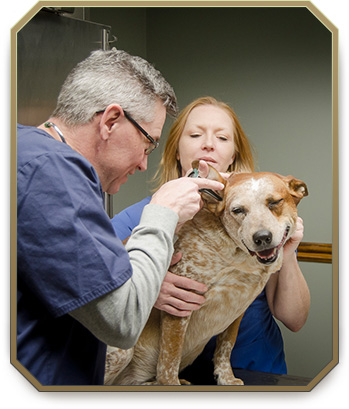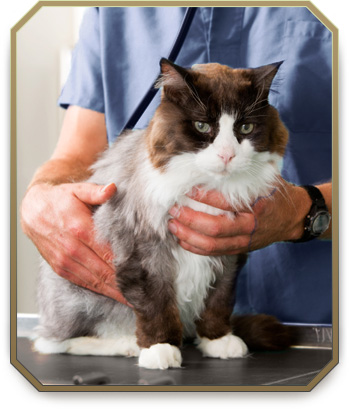Wellness for Every Age and Stage
 At Slidell Veterinary Hospital, we recognize that in order to provide your pet with a long and happy life, as well as to limit the lifetime cost of care, our focus must be on preventive medicine. This is why when you come to Slidell Veterinary Hospital, we work with you to create a lifetime preventive health care plan that includes annual wellness examinations, a balanced vaccination schedule, and routine dental care.
At Slidell Veterinary Hospital, we recognize that in order to provide your pet with a long and happy life, as well as to limit the lifetime cost of care, our focus must be on preventive medicine. This is why when you come to Slidell Veterinary Hospital, we work with you to create a lifetime preventive health care plan that includes annual wellness examinations, a balanced vaccination schedule, and routine dental care.
Beyond these standard elements of good preventive care, we also offer microchip identification in case your pet should become lost, nutritional and behavioral counseling, internal medicine services, soft tissue and orthopedic surgery, advanced diagnostic testing capabilities, and much more.
One of the most important elements of your pet's care is strong client/doctor communication. It is important that you voice any concerns you may have so, together, we can optimize your pet's health care plan. It is also our responsibility to empower you with the information necessary to provide the best and most compassionate home-based care for your pet. We know that a great way to maximize our medical knowledge is to share it with you.
Please take a look at the comprehensive wellness services offered at Slidell Veterinary Hospital and learn why they are important for the care of your pet. Then feel free to give us a call at (985) 643-4822 to make an appointment or for more information.
Wellness Exams at Slidell Veterinary Hospital: The Standard of Lifetime Care
The veterinarians at Slidell Veterinary Hospital recommend a complete nose-to-tail physical examination at least once a year, though more frequent exams are encouraged. During your pet's wellness checkup, your veterinarian will:
Listen to your pet's heart. Early signs of cardiac disease such as heart murmurs and abnormal heart beat patterns known as arrhythmias can be heard through a stethoscope. Discovering these initial indicators of an underlying condition will lead to treatment before it becomes a more serious health threat.
Listen to your pet's lungs. Health issues such as infections, obstructive diseases and other problems can be detected by listening to your pet's lungs through a stethoscope. The doctor can also assess the overall pulmonary health of your pet.
Check your pet's teeth and oral cavity. Infections and other forms of dental disease can lead to very serious systemic health issues. We also take the time to discuss proper home dental care with you.
 Evaluate your pet's vision. Ocular conditions, such as glaucoma, corneal ulcers and dry eye, can be prevented or better treated through regular care and screenings.
Evaluate your pet's vision. Ocular conditions, such as glaucoma, corneal ulcers and dry eye, can be prevented or better treated through regular care and screenings.
Look into your pet's ears. Ear disease is relatively common in many types of pets. Regular examinations can prevent most forms of ear disease from developing or stop its progression.
Palpate the lymph nodes, abdomen, and skin. By feeling these areas, we are looking for unusual lumps or swellings. The skin is also evaluated for discolorations, lesions or patterns of hair loss or thinning, which could be signs of more complicated health issues.
Palpate joints and muscles. By examining the joints, legs and other areas of the body, we are able to evaluate for swelling, decreased muscle tone and variations in muscle size that may indicate developing orthopedic issues. In older pets, we look for signs of arthritis, which can be treated if found early.
Lab work. A complete physical exam includes a heartworm test and blood tests. A chemistry panel and blood count can screen for the presence of underlying disease processes and create a baseline should your pet become ill between routine examinations.
Parasite testing. Checking your pet for intestinal parasites is an important component of any preventative care plan for your pet and your family. For example, parasites such as hookworms are considered zoonotic, which means they can affect humans too.
At home, watch for subtle changes in your pet's body weight, appetite, water intake, urination and bowel habits, as well as general attitude and activity level. These changes may be signs of medical problems. Lumps and bumps under the skin may seem harmless, but can be cancerous. Ear infections, abscessed teeth and gum disease are common, painful conditions that may not become obvious until seriously advanced. A comprehensive physical exam is the tool to evaluate your dog's, cat's or other pet's health status and to help you make informed decisions about the care of your special companion.
Vaccines Customized for Your Northshore Pet
Due to the many recent discoveries and innovations in veterinary medicine, your pet can be protected against most major infectious diseases. Today, many immunizations and preventative treatments are available that did not exist a decade ago.
Up-to-date vaccinations play a large part in keeping your pet healthy and free from disease. However, not every pet requires the same series or frequency of vaccines. Our staff at Slidell Veterinary Hospital can assist you in deciding which preventative measures are necessary for your pet based on his or her lifestyle and recommendations from the American Veterinary Medical Association. Vaccine schedules are balanced to provide needed protection while not over-vaccinating your pet. Please contact us for more information about vaccinations.
Core Puppy and Adult Canine Vaccines
- Rabies
- Distemper
- Parvovirus
- Infectious Hepatitis
- Leptospirosis
- Bordetella
 Core Kitten and Adult Feline Vaccines
Core Kitten and Adult Feline Vaccines
- Rabies
- Panleukopenia (distemper)
- Feline Leukemia
- Feline Immunodeficiency Virus (available)
Kittens are also tested and treated for parasites common in young cats.
Heartworm Disease
Heartworm disease is a life-threatening mosquito-borne disease affecting dogs and, to a lesser extent, cats. Clinical symptoms of heartworm disease develop very slowly and include lack of energy and exercise intolerance, coughing, and difficulty breathing. Because heartworm disease is both a common and deadly disease, we recommend that your dog be tested annually.
Heartworm disease prevention is simple and effective. For dogs, a once-a-month heartworm preventative can be given as a tasty, chewable treat. This same chewable medicine prevents not only heartworms from developing, but also kills and prevents most other types of worms that can infect your dog. We also offer a six-month preventative injection for those forgetful folks. Cats are protected by applying a drop of heartworm prevention liquid to the skin once a month. We recommend this to prevent heartworm disease as well as fleas, ear mites, and other types of worms that can infect your cat.
If you would like to have your pet tested for heartworm disease, or if you would like additional information on how best to protect your pet from this dangerous parasite, please call Slidell Veterinary Hospital today for an appointment.
Flea and Tick Prevention in Slidell, LA
Beyond causing serious discomfort and infesting your home, fleas and ticks can carry diseases dangerous to both you and your pet. In our area, fleas are most prevalent during the warm weather; however, if left untreated, they can be a nuisance year-round. While ticks are not a serious problem in the Southeast, they are in other parts of the country, especially where they carry blood-borne infections like Lyme disease. If you travel with your pet to an area where ticks are abundant, please talk to one of our veterinarians about all the precautions to take for your pet's protection — and yours.
The good news is that flea and tick problems can be largely avoided by using parasite prevention products that are available at our hospital. When used properly and according to our directions, these products are very safe and effective. They are what we use on our own pets.
Puppy and Kitten Care
Puppies and kittens require a little extra attention to ensure they get a good, healthy start at life. This means that comprehensive physical exams at key developmental stages are essential. Your first visits with your new puppy or kitten at Slidell Veterinary Hospital are perhaps the most important. These initial visits are where you, one of our veterinarians, and your pet first meet and begin to form the relationship that lasts throughout your pet's life. We take plenty of time with these visits to give your puppy or kitten a thorough examination, talk with you about concerns you may have, offer health care and training advice, and more.
This is your new kitten or puppy and we're happy to answer all of your questions.
 Senior Pet Care
Senior Pet Care
Thanks to advances in veterinary medicine, pets are living longer than ever. Your senior pet has medical needs that are very different from puppies and kittens, though. At Slidell Veterinary Hospital, we work with you to develop a health care plan that ensures your pet is safe and happy throughout his or her "golden years."
Pets age faster than people and are considered to be "seniors" around age 7. The best time to begin your pet's senior care program and recognize the need for a little extra TLC is well before age related conditions begin to set in. We recommend all senior pets undergo at least one physical examination each year, though more frequent examinations are encouraged. During an examination, we also perform tests that can detect the signs of heart disease, infection, diabetes, and other health problems. In some cases, conditions that may look like the usual signs of "old age" could actually be signs of a more serious problem, such as arthritis, periodontal disease, kidney failure, or cancer.
There is also an important role for you to play as your pet's primary caregiver. While you cannot control age related decline, you can influence your pet's activity level, living conditions, daily nutrition, and access to quality senior veterinary care. With our help, you can manage these factors in order to prolong your pet's good health, vitality, and increase his or her well-being, even as his or her pace slows a bit.
Exotic Pet Care
Dr. Firmin and our Slidell medical team offer wellness care programs for ferrets, rabbits, and some reptiles, as well as nail trims and wing trims for birds. Since it is often difficult to determine if an exotic pet is ill, we strongly recommend physical examinations twice a year to check for health problems plus annual monitoring to check for nutritional and husbandry-related conditions. With bi-annual medical examinations by Dr. Firmin at Slidell Veterinary Hospital, problems are often diagnosed before they become serious medical conditions.
After acquiring your new exotic pet, a complete wellness appointment is strongly recommended. This exam includes a thorough physical examination, husbandry and nutritional consultation, disease screening and laboratory testing if necessary. Before bringing your pet into your home, you want to make sure that he or she is healthy.
For more information about Slidell Veterinary Hospital's comprehensive wellness care for your pet, please email or call us at (985) 643-4822. We are always happy to answer any questions you may have.